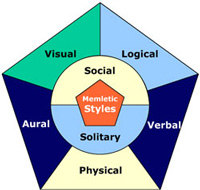The Logical (Mathematical) Learning Style
If you use the logical style, you like using your brain for logical and
mathematical reasoning. You can recognize patterns easily, as well as
connections between seemingly meaningless content. This also leads you to
classify and group information to help you learn or understand it.
You work well with numbers and you can perform complex calculations. You
remember the basics of trigonometry and algebra, and you can do moderately
complex calculations in your head.
You typically work through problems and issues in a systematic way, and
you like to create procedures for future use. You are happy setting
numerical targets and budgets, and you track your progress towards these.
You like creating agendas, itineraries, and to-do lists, and you typically
number and rank them before putting them into action.
Your scientific approach to thinking means you often support your points
with logical examples or statistics. You pick up logic flaws in other
peoples words, writing or actions, and you may point these out to people
(not always to everyone's amusement).
You like working out strategies and using simulation. You may like games
such as brainteasers, backgammon, and chess. You may also like PC games such
as Dune II, Starcraft, Age of Empires, Sid Meier games and others.
Common Pursuits and Phrases
People with a strong logical style are likely to follow such pursuits as
the sciences, mathematics, accounting, detective work, law and computer
programming.
You are more likely to use phrases that reflect your most dominant style
out of the visual, aural or physical styles, however you may also use
phrases like these:
- That's logical.
- Follow the process, procedure, or rules.
- There's no pattern to this.
- Let's make a list.
- We can work it out.
- Quantify it, or prove it!
Learning and techniques
-
If you are a logical learner, aim to understand the reasons behind your
content and skills. Don't just rote learn. Understanding more detail behind
your compulsory content helps you memorize and learn the material that you
need to know. Explore the links between various systems, and note them down.
-
While you study, create and use lists by extracting key points from your
material. You may also want to use statistics and other analysis to help you
identify areas you may want to concentrate on.
-
Pay attention to your physical state, for example your breathing and
stress level. It's possible that you isolate your own body from your
rational thought. Remember that you are just as much a part of the 'system'
as any equipment you may be using.
-
Also remember that association often works well when it is illogical and
irrational. It doesn't matter how logical two items are together. You have a
better chance of recalling them later if you have make the association
illogical. Your brain may protest at first!
-
In your scripting though, highlight logical thoughts and behaviors.
Highlight your ability to pick up systems and procedures easily, and that
you can detect when you need to change a set procedure.
-
Make use of 'systems thinking' to help understand the links between
various parts of a system. An important point here is that systems thinking
helps you understand the bigger picture. Often the whole is greater than the
sum of the parts. For example, you may understand the individual aircraft
systems and flight surfaces, but you may not have a view of how all those
systems support flight in equilibrium. Systems diagrams can help you gain
that understanding.
-
You may find it challenging to change existing behaviors or habits. You
can rationalize all you want to about why you should change a behavior, but
you may find it persists. Try the shunt technique to understand what
behavior you currently have and what behavior you want to have. When you
understand those behaviors, use the technique to divert from the old
behavior to the new.
-
You may sometimes overanalyze certain parts of your learning or training.
This can lead to analysis paralysis. You may be busy, but not moving towards
your goal. If you find you are overanalyzing which school to start with, or
you are over-planning your course maps, stop and refocus on activities that
move you forward. Consider how much 'bang for buck' you get from spending
more time than necessary. Measure your activities by your speed towards your
goal. Planning exactly how much time to spend on each chapter of theory
doesn't help learn it anywhere near as fast as starting on the theory!
-
If you often focus from analysis paralysis, write 'Do It Now' in big
letters on some signs or post-it notes. Place them in strategic places
around your work or study area.

